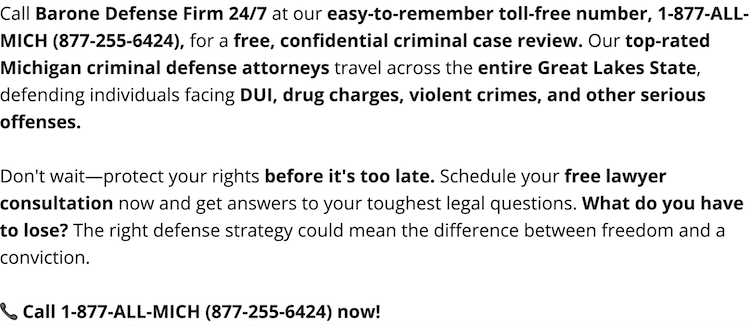Building a Defense for Drug Charges
Under certain circumstances, a drug charge can be dropped before it even gets started, meaning after the person has been arrested but before the drug charges are brought to trial. It would also be possible for a Michigan drug attorney to intercede even before an arrest is made, such as when a person is brought in for questioning. However, for this to happen it requires that the person being investigated for the drug crime contact an attorney to have them contact the police on their behalf prior to the arrest.
Once the drug charges have made it into the court system, an early dismissal is still possible. An early dismissal will be based on there being a legal defect in the case, such as when someone's constitutional, statutory, or administrative rights have been violated. Those types of violations can sometimes be leveraged into the charge being dropped, sometimes very early in the case.
Constitutional DefensesThe most common constitutional violations are those involving the Fourth Amendment search and seizure. In almost every drug case, there is some type of a search that reveals the drugs used as the basis of the charge.
Other constitutional violations of the Fifth, Sixth and Eighth Amendments, include the right to counsel and the right to remain silent.
The right to remain silent is a fairly common drug defense strategy because as soon as a person is found in possession of or under the influence of drugs, the police may begin asking questions and with which the answers are the basis on which the charges are brought and a violation of a person's rights.
Prosecutorial MistakesPolice mistakes happen in pretty much every case. However, the question is how best to use these mistakes when building a Michigan drug defense and whether those mistakes can lead to the reduction or the dismissal of the charges altogether.
In some instances, the evidence can be mishandled, contaminated, lost, or mixed up in the collection of it. Additionally, more mistakes can happen when the drugs are sent to the lab for testing.
Once the attorney has identified the prosecution's mistake, the attorney will determine whether the evidence of the mistake should be used as part of a negotiating tactic with the prosecutor or to bring it to the court's attention as part of an effort to try to get the drug case dismissed.
Collateral ConsequencesThere are collateral consequences to a drug conviction outside of the judge's sentenced penalties. A drug charge can lead to a loss of a job and insurance, denial of loans and employment, as well as admission to clubs, associations, and colleges. Understanding the full collateral consequences of a charge is important to fully support developing a defense against your Michigan drug charge.
It is important to note that those consequences can arise many, many years after the person has been convicted and completed their sentence. For assistance in building a strong Michigan drug defense, contact our office today.
Scientific Defense StrategyDue to the fact that all drugs must be tested by a state lab and a toxicology report produced, it is good to have a Michigan drug lawyer who is knowledgeable about the science of drug testing in order that they might mount a strategic Michigan drug defense based in science. Such a knowledgeable attorney can determine if the reported result on the toxicology report is valid in cases where the state lab gets it wrong, and produce a report that says something is or contains a drug and are then mistaken.
One example is with THC, the active ingredient in Marijuana. The lab is just not able to properly measure low amounts of THC but this does not stop them from issuing reports with results as low as 1 ng/Ml. There is significant uncertainty in the labs reported results and by their own admission, the lab's result can be as much as 50% wrong.
Finally, it is not unusual for the police to be in violation of their own laws or the procedures dictated by their department or the Michigan State Police, or for the toxicology lab in testing the drug to make mistakes. Any of these mistakes have the potential to lead to a reduction or even the dismissal of a case.
 Barone Defense Firm Home
Barone Defense Firm Home




















